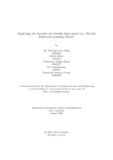| dc.contributor.advisor | Zaman, Shakila | |
| dc.contributor.advisor | Hossain, Dr. Muhammad Iqbal | |
| dc.contributor.author | Shafin, Md. Mehtabul Islam | |
| dc.contributor.author | Akhter, Sabrin | |
| dc.contributor.author | Hasan, Mohammad Shafkat | |
| dc.contributor.author | Nasimuzzaman, Md. | |
| dc.contributor.author | Prithul, Tamzeedur Rahman | |
| dc.date.accessioned | 2023-08-06T05:53:37Z | |
| dc.date.available | 2023-08-06T05:53:37Z | |
| dc.date.copyright | 2023 | |
| dc.date.issued | 2023-01 | |
| dc.identifier.other | ID: 19101088 | |
| dc.identifier.other | ID: 18301098 | |
| dc.identifier.other | ID: 19101077 | |
| dc.identifier.other | ID: 19101051 | |
| dc.identifier.other | ID: 18301289 | |
| dc.identifier.uri | http://hdl.handle.net/10361/19294 | |
| dc.description | This thesis is submitted in partial fulfillment of the requirements for the degree of Bachelor of Science in Computer Science, 2023. | en_US |
| dc.description | Cataloged from PDF version of thesis. | |
| dc.description | Includes bibliographical references (pages 42-45). | |
| dc.description.abstract | This research aims to provide an approach for analyzing the security of the e-health
care system through the use of federated learning and the pre-processing of distinct
deep learning models. The infrastructure for e-healthcare services is being gradually
deployed by the health sector. This method increased the safety of patients and
doctors through a protected platform. As a result, it is going to replace the current
health service. Even if this technology is becoming more and more widespread, a
number of data security threats need to be tackled. In this research, a CNN and
MLP architecture with a classification-focused approach using a number of pre trained feature extractors such as ResNet-50, VGG16, and Inception- v3 have been
implemented. Additionally, various machine learning classification algorithms (such
as Random Forest, and Logistic Regression) have been used to classify the images in
order to compare how well they perform to a neural network approach. Federated
learning has also been incorporated to increase healthcare data security as it does
not transmit actual data but models. The objective is to develop a hybrid federated
learning model to analyze the security of e-health data. The core premise is to
utilize a methodology like federated learning, which enables a technique for creating
machine learning models while safeguarding user privacy and can maintain e-health
data security without transferring real-world data. | en_US |
| dc.description.statementofresponsibility | Md. Mehtabul Islam Shafin | |
| dc.description.statementofresponsibility | Sabrin Akhter | |
| dc.description.statementofresponsibility | Mohammad Shafkat Hasan | |
| dc.description.statementofresponsibility | Md. Nasimuzzaman | |
| dc.description.statementofresponsibility | Tamzeedur Rahman Prithul | |
| dc.format.extent | 45 pages | |
| dc.language.iso | en | en_US |
| dc.publisher | Brac University | en_US |
| dc.rights | Brac University theses are protected by copyright. They may be viewed from this source for any purpose, but reproduction or distribution in any format is prohibited without written permission. | |
| dc.subject | Federated learning | en_US |
| dc.subject | Machine learning | en_US |
| dc.subject | e-Health care | en_US |
| dc.subject | CNN | en_US |
| dc.subject | MLP | en_US |
| dc.subject | Random forest | en_US |
| dc.subject | Logistic regression | en_US |
| dc.subject.lcsh | Medical informatics. | |
| dc.subject.lcsh | Medical telematics. | |
| dc.title | Analyzing the security of e-Health data based on a hybrid federated learning model | en_US |
| dc.type | Thesis | en_US |
| dc.contributor.department | Department of Computer Science and Engineering, Brac University | |
| dc.description.degree | B. Computer Science | |

